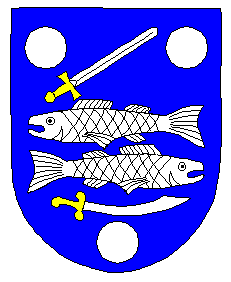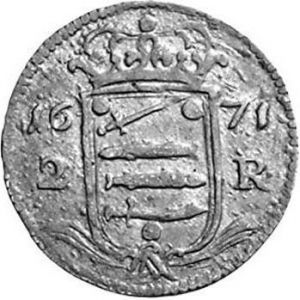Narva: Difference between revisions
Knorrepoes (talk | contribs) m (Text replacement - "====Origin/meaning====" to "===Origin/meaning===") |
Knorrepoes (talk | contribs) |
||
| (2 intermediate revisions by the same user not shown) | |||
| Line 1: | Line 1: | ||
{{ | {{ee}} | ||
'''NARVA''' | '''NARVA''' | ||
| Line 7: | Line 7: | ||
[[File:narva.gif|center|Arms of {{PAGENAME}}]] | [[File:narva.gif|center|Arms of {{PAGENAME}}]] | ||
===Official blazon=== | |||
Sinisel kilbil hõbedased kaks kohakuti vastassuundades kala ja kaks mõõka ja kolm sõõri. | Sinisel kilbil hõbedased kaks kohakuti vastassuundades kala ja kaks mõõka ja kolm sõõri. | ||
| Line 16: | Line 16: | ||
The sword and scimitar are based on the arms of Karelia and date from the Swedish time (compare also the arms of [[Finland]]. | The sword and scimitar are based on the arms of Karelia and date from the Swedish time (compare also the arms of [[Finland]]. | ||
{|align="center" | |||
|align="center"|[[File:{{PAGENAME}}c1.jpg|center|300 px|Arms of {{PAGENAME}}]] <br/>The arms on a 1671 coin | |||
|} | |||
{{media}} | {{media}} | ||
Revision as of 07:22, 29 November 2019
NARVA
County: Ida-Virumaa
Official blazon
Sinisel kilbil hõbedased kaks kohakuti vastassuundades kala ja kaks mõõka ja kolm sõõri.
Origin/meaning
The arms were officially granted on July 24, 1992, but date from 1937.
The two fish refer to the importance of Narva as a fishing harbour. The three cannon balls symbolise that the city has been an important border town during its history. Narva was a longtime Swedish town on the border with Russia (now the Estonian-Russian border).
The sword and scimitar are based on the arms of Karelia and date from the Swedish time (compare also the arms of Finland.
| The arms on a 1671 coin |
Contact and Support
Partners:
Your logo here ?
Contact us
© since 1995, Heraldry of the World, Ralf Hartemink 
Index of the site
Literature : Image taken from http://valitsus.ee/et/riigikantselei/riigi-ja-omavalitsuste-symbolid/ and Troels P. Roland














